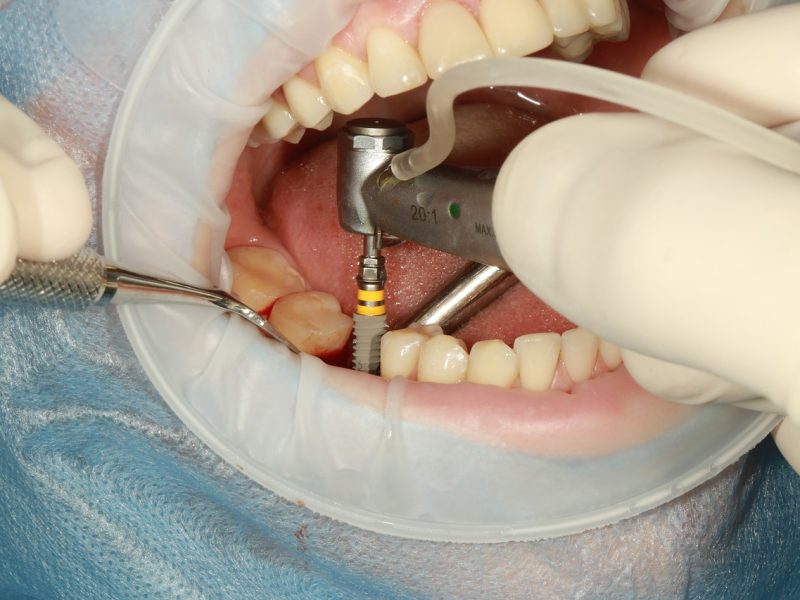Can Dental Implants Be Done Under IV Sedation?
Considering dental implants under IV sedation? You’re in the right place to learn how this method can offer a smoother and more comfortable experience for those seeking dental restoration. Here, we explore how IV sedation can enhance the implant process, ensuring both relaxation and safety.

Benefits of IV Sedation for Dental Implants Procedure
IV sedation during dental implant procedures offers several benefits that make it a preferred choice for many patients and dentists alike. Here’s a detailed look at why this sedation method is so valuable:
Reduced Anxiety and Discomfort
IV sedation induces a state of deep relaxation. This means that patients who might feel nervous about dental work can comfortably undergo procedures without experiencing significant stress or fear.
Faster Onset of Sedation
Unlike oral sedatives, which can take time to become effective, IV sedation works almost immediately. This rapid onset allows the dentist to begin the procedure without delay, making the visit more efficient.
Controlled Sedation Levels
The dentist or anesthesiologist can adjust the level of sedation with IV administration in real-time. This flexibility ensures that patients receive exactly the right amount of sedative to remain comfortable throughout their procedure without being overly sedated.
Amnesia Effect
Many patients have little to no memory of the procedure after it’s over, thanks to the amnesic effect of drugs used in IV sedation. This is particularly beneficial for those who may have dental phobias or anxiety about the procedure.
Safety and Monitoring
With IV sedation, patients are continuously monitored by professional dental staff. This includes tracking vital signs such as heart rate and blood pressure and ensuring that the patient remains safe throughout the procedure.
Efficiency in Complex Procedures
For more complex or lengthy dental implant processes, IV sedation allows patients to tolerate longer sessions that might be necessary. This can sometimes reduce the number of visits required to complete their treatment.
What to Expect Before, During, and After Your Procedure
How to Prepare for Dental Implant Procedure Under IV Sedation
Before your dental implant procedure, there are several important steps you’ll need to take to ensure everything goes smoothly:
Consultation and Health Review: You’ll have a consultation with your dentist where your medical history will be reviewed to ensure IV sedation is safe for you. Mention all medications you are currently taking.
Fasting: Generally, you will be advised to fast for about 6-8 hours before your appointment. This means no food or drink, which helps to prevent any complications during sedation.
Arrange Transportation: Since you’ll be under sedation, you won’t be able to drive. Arrange for someone to bring you to the clinic and take you home afterwards.
Clothing and Personal Items: Wear comfortable, loose-fitting clothing. Avoid bringing valuables or wearing jewellery to the procedure.
What to Expect During Dental Implant Procedure under IV Sedation
During the procedure, your comfort and safety are the top priorities:
Starting IV Sedation: An IV line will be set up, usually in your arm or hand, through which the sedation medication is administered. You’ll begin to feel relaxed very quickly.
Monitoring: Your vital signs, such as heart rate and blood pressure, will be continuously monitored to ensure your safety throughout the procedure.
Dental Implant Placement: While under IV sedation or twilight sedation, patients are not completely asleep because it is a form of conscious sedation. They are rather in a dream-like state and very relaxed. The dentist will perform the necessary steps to place the dental implant, which involves surgically inserting a titanium post into your jawbone.
No Pain: Due to the sedation and local anaesthetics used, you should feel no pain during the procedure. Any sensation of discomfort is typically minimal.

Recovery and Aftercare
After the procedure, the focus shifts to your recovery and the care of your new implant:
Immediate Post-Procedure: Once the implant is placed, you’ll spend a short period in the recovery area as the sedation wears off. You might feel groggy, so it’s important to have someone with you.
Home Care: You’ll receive specific instructions on how to care for the implant site, which will include guidelines on oral hygiene, medications to manage any pain or swelling, and foods to avoid.
Follow-Up Visits: Schedule follow-up visits with your dentist to monitor the healing process and ensure the implant is integrating well with your bone.
Long-Term Care: Proper care and maintenance can extend the life of your dental implants. Regular check-ups, good oral hygiene, and avoiding certain habits like smoking will contribute to the long-term success of your treatment.
Are There Any Risks or Complications Involved?
While IV sedation and dental implant procedures are generally safe and highly effective, like any medical treatment, they come with certain risks and potential complications. Understanding these can help you make an informed decision and prepare adequately.
Allergic Reactions: Rarely, patients may experience allergic reactions to the sedatives used in IV sedation. It’s important to discuss any known allergies with your dentist before the procedure.
Sedation-Related Risks: While uncommon, there can be risks associated with sedation, such as respiratory issues or adverse reactions to sedation drugs. Dentists mitigate these risks by closely monitoring your vital signs during the procedure.
Infection: Any surgery that involves incisions can lead to infections. Dentists prevent this by maintaining a sterile environment during the implant procedure and prescribing antibiotics when necessary.
Implant Failure: In some cases, the implant may not integrate well with the jawbone, which can lead to failure of the implant. Smoking and certain medical conditions can increase this risk.
Nerve Damage: There is a small risk of nerve damage during the dental implant procedure, which can cause numbness or tingling. This is usually temporary but can be permanent in rare cases.
Sinus Problems: For implants in the upper jaw, there’s a risk of affecting sinus cavities, potentially leading to sinusitis or other issues. This is carefully considered and avoided with proper planning and techniques.
Steps to Minimize Risks
Thorough Planning: Dentists conduct detailed assessments, including X-rays or CT scans, to plan the procedure accurately and avoid critical areas like nerves and sinuses.
Sterile Techniques: Using sterile surgical techniques and equipment helps prevent infection.
Pre-Procedure Checks: Assessing a patient’s medical history and current health status helps to tailor the sedation to their specific needs, reducing the likelihood of complications.
Post-Procedure Care: Providing detailed aftercare instructions to patients helps manage and mitigate common issues like swelling and infection.
Follow-Up Appointments: Regular check-ups after the procedure ensure that any potential problems are identified and addressed early.
Are You a Candidate for IV Sedation? Find Out Here
If you’re considering dental implants and wondering whether IV sedation is right for you, there are specific criteria that help determine if you’re a good candidate. Understanding these can ensure that the procedure is both safe and comfortable for you.
Key Criteria for IV Sedation Candidates
Overall Health Status: Ideal candidates are generally in good health. Conditions such as uncontrolled diabetes, heart disease, or respiratory illnesses may complicate the use of sedatives.
Anxiety Level: If you have significant anxiety about dental procedures, IV sedation can help make the experience more manageable and less stressful.
Medical History: It’s crucial to disclose your full medical history to your dentist. This includes any allergies, medications you are currently taking, and past reactions to anaesthesia.
Medication Review: Some medications can interfere with sedatives. Make sure to provide your dentist with a list of all medications, including over-the-counter drugs and supplements.
Previous Surgeries: Your history of surgeries, especially related to anaesthesia, can affect your candidacy for IV sedation.
Steps to Determine Your Suitability
Consultation: Schedule a consultation with your dentist or a sedation specialist to discuss your needs and concerns about dental implants and sedation.
Health Assessment: Undergo a health assessment to ensure that IV sedation is safe for you. This may include a physical examination and possibly some lab tests.
Discussion of Sedation Levels: Your dentist will recommend the most appropriate level of sedation based on your anxiety level and the complexity of the procedure.
Pre-Sedation Instructions: If you are deemed a suitable candidate, you will receive detailed instructions to prepare for the procedure, ensuring your safety and comfort.

Frequently Asked Questions
Is IV sedation necessary for dental implants?
IV sedation is not essential for all dental implant procedures, but it can be beneficial for patients with severe anxiety or for those undergoing extensive treatments. It helps patients remain relaxed and comfortable, ensuring a smoother experience. Patients usually have no memory of the procedure under IV sedation.
How safe is IV sedation?
IV sedation is considered safe when administered by a certified professional. It allows for real-time adjustment of sedation levels, ensuring that the patient remains comfortable throughout the procedure. Safety protocols are rigorously followed, and the sedative effects are monitored continuously.
What are the benefits of choosing IV sedation for dental implants?
IV sedation offers rapid relaxation and a deep level of sedation without complete unconsciousness. It’s beneficial for controlling pain and anxiety, allowing for a more pleasant dental experience. Patients often report feeling better and more relaxed the next day compared to undergoing the procedure without sedation.
What will I remember about the procedure?
Most patients remember very little, if anything, from the procedure due to the amnesic effects of the drugs used in IV sedation. This is often seen as an advantage for those who have dental anxiety or fear.
What are the common side effects of IV sedation?
After the procedure, some common side effects may include nausea, headaches, and a lethargic feeling, but these are generally mild and transient. Proper care and monitoring post-procedure help manage these effects effectively.
Can any dentist perform IV sedation?
Not all dentists are qualified to administer IV sedation. Only those who have received specific training and certification in sedation dentistry can perform this type of sedation, ensuring patient safety and comfort.